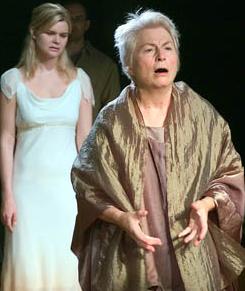SITE GUIDE
SEARCH
REVIEWS
FEATURES
NEWS
Etcetera and
Short Term Listings
LISTINGS
Broadway
Off-Broadway
NYC Restaurants
BOOKS and CDs
OTHER PLACES
Berkshires
London
California
New Jersey
DC
Philadelphia
Elsewhere
QUOTES
TKTS
PLAYWRIGHTS' ALBUMS
LETTERS TO EDITOR
FILM
LINKS
MISCELLANEOUS
Free Updates
Masthead
Writing for Us
A CurtainUp Review
Hecuba
|
Be like a painter. Stand back; see me in perspective. ---Hecuba, pleading with Agamemnon |

Heather Tom as Polyxena & Kristin Linklater as Hecuba (Photo: David Gochfeld )
|
Thanks to Kristin Linklater, it is time to reverse the age old biblical quotation often attributed to teachers (Mt 23:2-3 "The teachers of the law and the Pharisees sit in Moses' seat. So you must obey them and do everything they tell you. But do not do what they do, for they do not practice what they preach.") Linklater has some fine acting credits, but she is most renowned over the past 40 years as a teacher of voice and speech training, as well as Shakespeare.
To see and hear Linklater's astonishing performance as Hecuba in Euripides’ Greek classic is a great treat. Her concentrated visceral fury as the fallen Queen of Troy never wanes but steadily builds into a towering inferno of dramatic intensity. Aided by an easy to access, yet lyrical, translation by William Arrowsmith, Linklater heads up a company that cannot help but be responsive to the onslaught of her words, the expressiveness of her face and the vividness of her body language.
Largely as the result of Helen’s actions, the Trojan kingdom is being ransacked and decimated by the victorious Greeks. Pity the once proud Trojan queen who, with her daughter Polyxena (Heather Tom) and the rest of the Trojan women (chorus), is now enslaved. With her bare feet wrapped with narrow strips of cloth, her short cropped white hair virtually bristling with rage, and her loose royal garment free to follow the centrifugal force within, we see Linklater become an emotional eddy drawing to her everyone who comes within her range.
The prologue that begins the action belongs to the Ghost of Polydorus (sensitively played by Lucas Blondheim) whose murdered body is found washed up by the sea. The next bit of grief comes with the news that the Greeks demand the life of Polyxena, as a sacrifice to revenge the slaying of Achilles. Given that Tom’s beauty is notable and would rival Helen’s, her courageous and composed response to the stiff-necked and unrelenting Odysseus (Curzon Dobell), watching her as she faces death is all the more touching. What follows is the first great demonstration of Hecuba’s impassioned side, as she pleads with wrenching poignancy for her daughter’s life.
But it is later that we see Hecuba’s skill at artful manipulation. That's when she reminds Agamemnon (given a proper autocratic arrogance by Mike Genovese) that she once spared his life and should now look aside as she takes out her revenge on the false Polymestor (Christopher McCann), the double-crossing family friend who killed Polydorus for his gold while in his care. Oh, dear. Can things get any worse? They do. Hecuba and the women vindictively attend to the blinding of Polydorus and the death his two young sons. This, however, is mercifully accomplished off-stage and with a minimum of gory detail. There are screams to be sure, but here the victims come from behind the screen dragging long strips of red fabric representing blood. No Medea-like blood-bath here.
The setting, the shore of the Thracian Chersonese, is starkly evoked by designer Erik Flatmo with three stone pillars and a couple of screens that reflect shadows. Except for the abstract use of red and white (for water), director Alex Lippard’s precisely naturalistic quasi-contemporary staging serves the needs of the ensuing breast-beating and brutality. Rebecca Dowd’s mostly black and dowdy clothes for the women and modern army dress for the men plus and Aaron Black’s moody lighting supply genuine atmospherics within the intimate space; so does the eerie original music composed and performed outside the stage area by Allison Leyton-Brown and Kaveh Nabatian and in some instances sung by the chorus.
This production is also a rare opportunity to see the extraordinary anguish-driven play itself. Written somewhere in the fifty years from 480 (the end of the war with Persia) to 430 (the start of the Peloponnesian War with Sparta which was to destroy Athens as an independent state), Hecuba is yet another reminder that Euripides (and Sophocles from the same time period), as well other playwrights down through the centuries, have been motivated to use the background of constant war and its potential to incite unjust and inhuman behavior to voice their concerns. Is anybody listening?
|
HECUBA By Euripides Translation by William Arrowsmith Directed by Alex Lippard Cast: Starring Kristin Linklater (Hecuba) with Lucas Blondheim (Ghost of Polydorus), Janna Gjesdal (Maidservant of Hecuba), Starla Benford (Coryphaeus), Phyllis Johnson, Dale Soules and Kathleen Turco-Lyon (Chorus), Heather Tom (Polyxena), Curzon Dobell (Odysseus), Scott Casper, Craig Myers and Matthew R. Wilson (Soldiers/Attendants), Helmar Augustus Cooper (Talthybius), Mike Genovese (Agamemnon), Christopher McCann (Polymestor) and James Gabriel Gilbert and Matthew Reid Seife (sons of Polymestor) Original Music Composed and Performed by Allison Leyton-Brown and Kaveh Nabatian Set Design: Erik Flatmo Costume Design: Rebecca Dowd Lighting Design: Aaron Black Sound Design and Musical Direction: Allison Leyton-Brown Fight Director: Rick Sordelet Movement: Barbara Allen Running Time: 1 hour 45 minutes, no intermission 45 Below at 45 Bleecker Theatre www.hecuba.info, 212/352-3101 Performances: 10/7/04 to 10/30/04 Thursday-Saturdays at 8PM; Sundays at 7PM; plus a 3PM matinee on Saturday, October 30. Tickets: $15 Reviewed by Simon Saltzman based on October 10th performance |

Retold by Tina Packer of Shakespeare & Co.
Click image to buy.
Our Review

Mendes at the Donmar
Our Review

At This Theater

Leonard Maltin's 2003 Movie and Video Guide

Ridiculous!The Theatrical Life & Times of Charles Ludlam

6, 500 Comparative Phrases including 800 Shakespearean Metaphors by CurtainUp's editor.
Click image to buy.
Go here for details and larger image.



